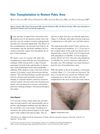 10 citations,
May 2013 in “Actas Dermo-Sifiliográficas”
10 citations,
May 2013 in “Actas Dermo-Sifiliográficas” Most white Spanish women have a widow's peak, and their hairline measurements could help in hair restoration surgery.
 2 citations,
January 2023 in “Pharmaceuticals”
2 citations,
January 2023 in “Pharmaceuticals” Natural products and phytochemicals may help with hair regrowth, but more research is needed.
 24 citations,
October 2007 in “Clinical and experimental dermatology”
24 citations,
October 2007 in “Clinical and experimental dermatology” Surgical excision with natural healing effectively treats acne keloidalis nuchae without recurrence.
 June 2023 in “Trichology and cosmetology:”
June 2023 in “Trichology and cosmetology:” Ageratum Conyzoides, when taken orally, can effectively reduce hair loss and improve hair growth.
January 2024 in “Medicina” Proper planning and technique in upper-face feminization surgery are crucial to avoid complications and revisions.
 11 citations,
January 2016 in “Indian Journal of Plastic Surgery/Indian journal of plastic surgery”
11 citations,
January 2016 in “Indian Journal of Plastic Surgery/Indian journal of plastic surgery” Direct brow lifting is effective, safe, and provides excellent long-lasting results for bald men or those with a high hairline.
 December 2022 in “The Journal of Cosmetic Medicine”
December 2022 in “The Journal of Cosmetic Medicine” Hairline-lowering surgery effectively reduces a high hairline with immediate, noticeable results.
 January 2017 in “Elsevier eBooks”
January 2017 in “Elsevier eBooks” The document concludes that choosing the right forehead and brow lifting technique based on individual patient characteristics is crucial to prevent complications and achieve desired results.
 8 citations,
October 2017 in “Dermatologic surgery”
8 citations,
October 2017 in “Dermatologic surgery” Maintain a natural, masculine look while rejuvenating the eye area with careful, tailored techniques.
 November 2023 in “International Journal For Multidisciplinary Research”
November 2023 in “International Journal For Multidisciplinary Research” Herbal hair oil made with natural ingredients helps reduce hair loss, dandruff, and graying.
 9 citations,
January 2005 in “Journal of Cosmetic and Laser Therapy”
9 citations,
January 2005 in “Journal of Cosmetic and Laser Therapy” In 2005, hair transplants looked natural and worked best with realistic goals, medication to preserve hair, and depended on the amount of donor hair.
 17 citations,
January 2010 in “PubMed”
17 citations,
January 2010 in “PubMed” Optimal storage solutions and effective additives are crucial for improving the survival of hair transplant grafts.
 3 citations,
December 2007 in “Dermatologic Surgery”
3 citations,
December 2007 in “Dermatologic Surgery” Hair transplantation successfully restored a woman's pubic hair with natural-looking results and few complications.
 17 citations,
October 2017 in “Journal of Cutaneous Medicine and Surgery”
17 citations,
October 2017 in “Journal of Cutaneous Medicine and Surgery” No treatment has been proven to effectively stop hair loss or regrow hair in Frontal Fibrosing Alopecia, and more research is needed.
 11 citations,
January 2015 in “Current problems in dermatology”
11 citations,
January 2015 in “Current problems in dermatology” The conclusion is that treatments like finasteride and minoxidil can prevent baldness progression and improve hair density, but more research is needed on other therapies.
January 2020 in “Menoufia Medical Journal” IGF-1R may play a role in female hair loss and could be a treatment target.
 November 2019 in “Quality in primary care”
November 2019 in “Quality in primary care” Scalp micropigmentation is a tattooing method that can mimic a full head of hair without surgery and has no healing time.
 4 citations,
April 2020 in “Journal of Cosmetic Dermatology”
4 citations,
April 2020 in “Journal of Cosmetic Dermatology” Low vitamin D levels are linked to different types of hair loss.
 March 2024 in “Skin research and technology”
March 2024 in “Skin research and technology” New dermoscopic criteria accurately diagnose and grade the severity of hair loss in androgenetic alopecia.
6 citations,
May 2019 in “JAMA Facial Plastic Surgery” Removing certain muscles during a browlift reduces glabellar wrinkles better long-term.
 1 citations,
May 2016 in “Hair transplant forum international”
1 citations,
May 2016 in “Hair transplant forum international” Using scalp micropigmentation (a special tattoo technique) with hair transplantation can effectively treat hair loss, especially for those with low donor density or those unsuitable for only hair transplantation.
 April 2016 in “Journal of Aesthetic Nursing”
April 2016 in “Journal of Aesthetic Nursing” Men are increasingly removing body hair for looks and cleanliness, and while hair loss can cause distress, it doesn't affect their self-esteem as much as it does in women.
 14 citations,
April 2021 in “Heliyon”
14 citations,
April 2021 in “Heliyon” Pomegranate leaf extract may help with hair growth, dandruff, and lice.
January 2023 in “Dermatologic Therapy” Intralesional corticosteroids and 5-alpha-reductase inhibitors are the best treatments for frontal fibrosing alopecia.
 January 2006 in “Dermatologic Surgery”
January 2006 in “Dermatologic Surgery” The Core Curriculum for Hair Restoration Surgery aims to improve doctor training for better, safer, and more natural-looking hair loss treatments.
 November 2015 in “Springer eBooks”
November 2015 in “Springer eBooks” Hair loss treated with minoxidil, finasteride, laser/light, hair transplant, and scalp prostheses; more research needed for skin of color.
1 citations,
March 2021 in “Frontiers in Medicine” Female pattern hair loss shows similar characteristics in both genders and should be classified by hair loss patterns, not gender.
12 citations,
January 2020 in “Indian Dermatology Online Journal” Female pattern hair loss has multiple causes and treatments, with new therapies showing promise.
 123 citations,
August 2005 in “Journal of the European Academy of Dermatology and Venereology”
123 citations,
August 2005 in “Journal of the European Academy of Dermatology and Venereology” The study found that Frontal Fibrosing Alopecia affects a broader age range of women and early treatment can help stop hair loss.
 January 2011 in “Der Pharmacia Lettre”
January 2011 in “Der Pharmacia Lettre” Pig oil was found to significantly promote hair growth in rats, more effectively than Minoxidil.
























